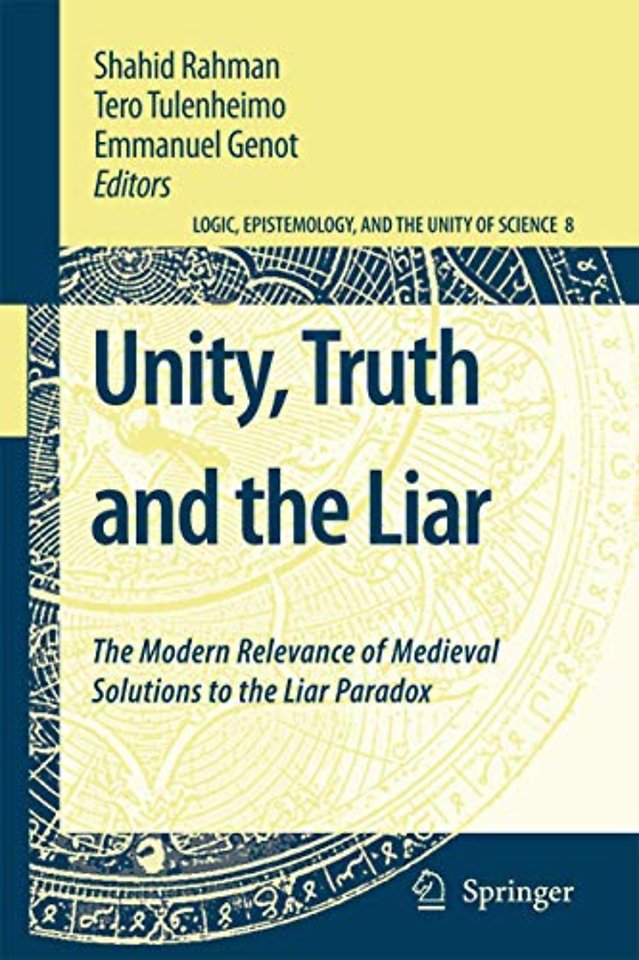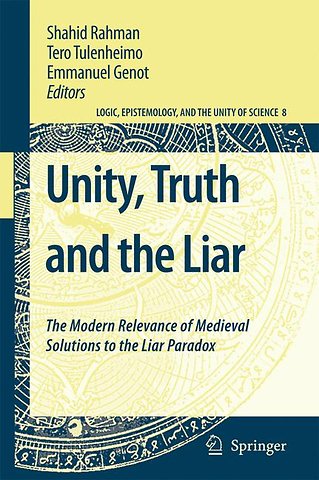Unity, Truth and the Liar
The Modern Relevance of Medieval Solutions to the Liar Paradox
Samenvatting
Andinmy haste, I said: “Allmenare Liars” 1 —Psalms 116:11 The Original Lie Philosophical analysis often reveals and seldom solves paradoxes. To quote Stephen Read: A paradox arises when an unacceptable conclusion is supported by a plausible argument from apparently acceptable premises. [...] So three di?erent reactions to the paradoxes are possible: to show that the r- soning is fallacious; or that the premises are not true after all; or that 2 the conclusion can in fact be accepted. There are sometimes elaborate ways to endorse a paradoxical conc- sion. One might be prepared to concede that indeed there are a number of grains that make a heap, but no possibility to know this number. However, some paradoxes are more threatening than others; showing the conclusiontobeacceptableisnotaseriousoption,iftheacceptanceleads to triviality. Among semantic paradoxes, the Liar (in any of its versions) 3 o?ers as its conclusion a bullet no one would be willing to bite. One of the most famous versions of the Liar Paradox was proposed by Epimenides, though its attribution to the Cretan poet and philosopher has only a relatively recent history. It seems indeed that Epimenides was mentioned neither in ancient nor in medieval treatments of the Liar 1 Jewish Publication Society translation. 2 Read [1].
Specificaties
Inhoudsopgave
1. The Truth Schema and the Liar (Target paper); Stephen Read (Proponent).- 2. Read and Indirect Revenge; Bradley Armour-Garb (Opponent).- 3. Tarski's Hidden Theory of Meaning: Sentences Say Exactly One Thing; Catarina Dutilh Novaes (Opponent).- 4. Doubting Thomas; Laurence Goldstein (Opponent).- 5. Logic Without Truth; Gyula Klima (Opponent).- 6. Scheming and Lying; Eugene Mills (Opponent).- 7. Comments on Stephen Read's 'The Truth-schema and the Liar'; Terence Parsons (Opponent).- 8. Models for Liars in Bradwardine's Theory of Truth; Greg Restall (Opponent).- Acknowledgments.- 9. On a New Account of the Liar; José M. Sagüillo (Opponent).- 10. The Liar Cannot Be Solved; György Serény (Opponent).- 11. Out of the Liar Tangle; B. Hartley Slater (Opponent).- 12. Read about T-scheme; Jan Wolenski (Opponent).- Acknowledgments.- 13. Further Thoughts on Tarski's T-scheme and the Liar; Stephen Read.- References.- Part II: Historical Background: Restrictionism versus the Manifold Theory of Meaning.-
14. Restrictionism: A Medieval Approach Revisited; Claude Panaccio.- Acknowledgments.- 15. William Heytesbury and the Treatment of Insolubilia in Fourteenth-Century England; Fabienne Pironet.

